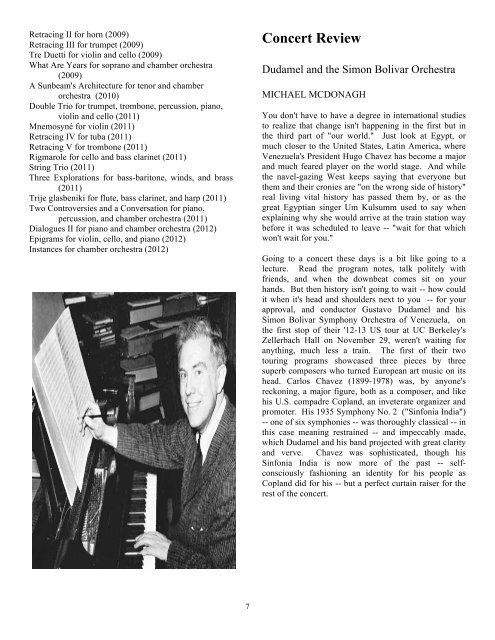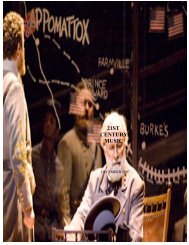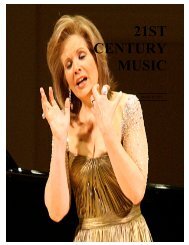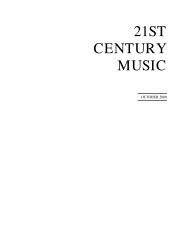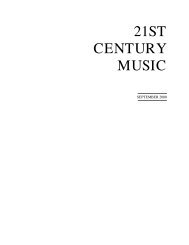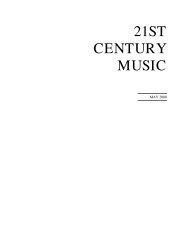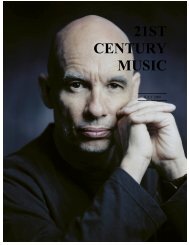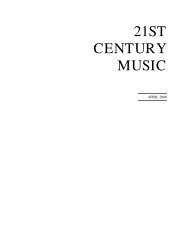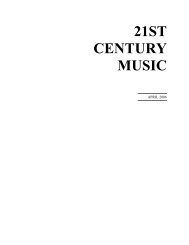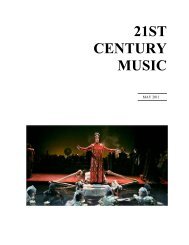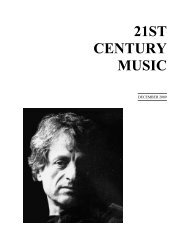Three Poems of Robert Frost for baritone and ensemble(1942)Elegy for viola and piano, also version for string quartet(1943)The Harmony of Morning for women's chorus andchamber orchestra (1944)<strong>Music</strong>ians Wrestle Everywhere for a cappella choir(1945)Piano Sonata (1946)Emblems for men's chorus and piano (1947)The Minotaur (1947)Cello Sonata (1948)Woodwind Quintet (1948)Eight Etudes and a Fantasy for wind quartet (1949)Eight Pieces for Four Timpani (1949)String Quartet No. 1 (1951)Sonata for flute, oboe, cello, and harpsichord (1952)Variations for orchestra (1955)String Quartet No. 2 (1959)Double Concerto for piano, harpsichord and 2 chamberorchestras (1961)Piano Concerto (1964)Concerto for Orchestra (1969)Canon for 3 (1971)String Quartet No. 3 (1971)Brass Quintet (1974)Duo for violin and piano (1974)A Mirror on Which to Dwell for soprano and ensemble(1975)A Symphony of Three Orchestras (1976)Birthday Fanfare for three trumpets, vibraphone, andglockenspiel (1978)Syringa for mezzo-soprano, bass-baritone, guitar, andensemble (1978)Night Fantasies (1980)In Sleep, in Thunder for tenor and ensemble (1981)Changes for guitar (1983)Triple Duo (1983)Esprit rude/esprit doux for flute and clarinet (1984)Canon for 4 (1984)Penthode for ensemble (1985)String Quartet No. 4 (1986)Oboe Concerto (1987)Enchanted Prelude for flute and cello (1988)Three Occasions for orchestra (1989)Violin Concerto (1989)Con leggerezza pensosa for clarinet, violin, and cello(1990)Quintet for piano and winds (1991)Scrivo in Vento for flute (1991)Trilogy for oboe and harp (1992)Esprit rude/esprit doux II for flute, clarinet, and marimba(1994)Figment for cello (1994)Fragment I for string quartet (1994)90+ (1994)6Of Challenge and of Love for soprano and piano (1994)Gra for clarinet, also version for trombone (1994)String Quartet No.5 (1995)Clarinet Concerto (1996)A 6-Letter Letter for English horn (1996)Symphonia: Sum fluxae pretium spei (1996)Luimen for ensemble (1997)Quintet for piano and string quartet (1997)Shard for guitar (1997)What Next? (1997)Fragment II for string quartet (1999)Tempo e Tempi for soprano, oboe, clarinet, violin,and cello (1999)Two Diversions (1999)ASKO Concerto for sixteen players (2000)Four Lauds for solo violin (2000)Retrouvailles (2000)Cello Concerto (2001)Figment II for cello (2001)Hiyoku for two clarinets (2001)Oboe Quartet, for oboe, violin, viola, and cello (2001)Steep Steps for bass clarinet (2001)Au Quai for bassoon and viola (2002)Boston Concerto (2002)Of Rewaking for mezzo-soprano and orchestra (2002)Retracing for bassoon (2002)Dialogues for piano and chamber orchestra (2003)Call for two trumpets and horn (2003)Mosaic for harp and ensemble (2004)Reflexions for ensemble (2004)Three Illusions for orchestra (2004)Soundings for piano and orchestra (2005)In the Distances of Sleep for mezzo-soprano andchamber orchestra (2006)Two Thoughts about the Piano (2006)Clarinet Quintet (2007)Figment III for contrabass (2007)Figment IV for viola (2007)HBHH for oboe (2007)Horn Concerto (2007)Interventions for piano and orchestra (2007)La Musique for solo voice (2007)Mad Regales for six solo voices (2007)Sound Fields for string orchestra (2007)Flute Concerto (2008)On Conversing with Paradise for baritone and chamberorchestra (2008)Poems of Louis Zukofsky for mezzo-soprano andclarinet (2008)Tintinnabulation for percussion sextet (2008)Tri-Tribute (2008)Wind Rose for wind ensemble (2008)Concertino for bass clarinet and chamber orchestra(2009)Figment V for marimba (2009)Nine by Five for wind quintet (2009)
Retracing II for horn (2009)Retracing III for trumpet (2009)Tre Duetti for violin and cello (2009)What Are Years for soprano and chamber orchestra(2009)A Sunbeam's Architecture for tenor and chamberorchestra (2010)Double Trio for trumpet, trombone, percussion, piano,violin and cello (2011)Mnemosyné for violin (2011)Retracing IV for tuba (2011)Retracing V for trombone (2011)Rigmarole for cello and bass clarinet (2011)String Trio (2011)Three Explorations for bass-baritone, winds, and brass(2011)Trije glasbeniki for flute, bass clarinet, and harp (2011)Two Controversies and a Conversation for piano,percussion, and chamber orchestra (2011)Dialogues II for piano and chamber orchestra (2012)Epigrams for violin, cello, and piano (2012)Instances for chamber orchestra (2012)Concert ReviewDudamel and the Simon Bolivar OrchestraMICHAEL MCDONAGHYou don't have to have a degree in international studiesto realize that change isn't happening in the first but inthe third part of "our world." Just look at Egypt, ormuch closer to the United States, Latin America, whereVenezuela's President Hugo Chavez has become a majorand much feared player on the world stage. And whilethe navel-gazing West keeps saying that everyone butthem and their cronies are "on the wrong side of history"real living vital history has passed them by, or as thegreat Egyptian singer Um Kulsumm used to say whenexplaining why she would arrive at the train station waybefore it was scheduled to leave -- "wait for that whichwon't wait for you."Going to a concert these days is a bit like going to alecture. Read the program notes, talk politely withfriends, and when the downbeat comes sit on yourhands. But then history isn't going to wait -- how couldit when it's head and shoulders next to you -- for yourapproval, and conductor Gustavo Dudamel and hisSimon Bolivar Symphony Orchestra of Venezuela, onthe first stop of their '12-13 US tour at UC Berkeley'sZellerbach Hall on November 29, weren't waiting foranything, much less a train. The first of their twotouring programs showcased three pieces by threesuperb composers who turned European art music on itshead. Carlos Chavez (1899-1978) was, by anyone'sreckoning, a major figure, both as a composer, and likehis U.S. compadre Copland, an inveterate organizer andpromoter. His 1935 Symphony No. 2 ("Sinfonia India")-- one of six symphonies -- was thoroughly classical -- inthis case meaning restrained -- and impeccably made,which Dudamel and his band projected with great clarityand verve. Chavez was sophisticated, though hisSinfonia India is now more of the past -- selfconsciouslyfashioning an identity for his people asCopland did for his -- but a perfect curtain raiser for therest of the concert.7


